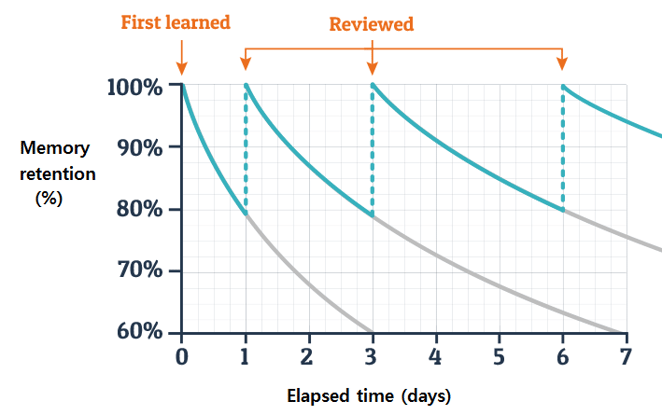We want our students to be practising their language skills between our classes, without the teacher, don’t we? This a surprisingly contentious question, and the answer really depends on who you ask - the student, teacher or language school.
The Case for Setting (Effective) Homework
Homework Slows the Forgetting Curve
The first reason to set homework is that it reinforces learning and counteracts the famous ‘forgetting curve’, a concept developed by the German psychologist Hermann Ebbinghaus. The ‘forgetting curve’ describes the rate at which information is forgotten after it is initially learned.

Image credit: https://performancematters.ca/ | Source: Chun, Bo Ae & Hae Ja, Heo.
As a brief explanation, forgetfulness is at its highest rate initially, meaning that we forget the most shortly after learning. The rate of forgetfulness decreases over time. Ebbinghaus found that the rate of forgetting can be reduced by applying the spaced repetition technique. By reviewing the information at increasing intervals, learners can flatten the curve and improve their retention of new knowledge.
The Education Endowment Foundation suggests that homework that has a clear purpose and is linked to online classroom work tends to be more effective. It also helps students keep up their sense of momentum.
Promotes Autonomy & Responsibility
The British Council notes that homework promotes learner autonomy and encourages students to take greater responsibility for their own learning. If you want a learner to learn faster, they have to be able to study and memorize ideas and do extra work by themselves.
Students are more likely to learn faster by practising their language skills more often. This is even more true if the homework is well executed and if the students would otherwise spend a few hours in class with their teacher. Homework creates a virtuous cycle where the more and faster they learn, the more they want to learn, and so the cycle continues. This is positive for all parties: students, sometimes their parents, teachers and schools.

The Case Against Setting Homework & Why It’s a Waste of Everyone’s Time
Many teachers and online language schools are sceptical that homework is useful. In fact, many might suggest it’s a complete waste of time. Homework detractors suggest that unless the homework is of high quality, there is little reason to set it. It can add stress to the student and other stakeholders. Without timely feedback, homework loses its effectiveness, and unless the student is practising the right skills at the right level, it will not be helpful.
Making Effective Homework Is Time-Consuming
Teachers are right to complain that setting high-quality homework takes time, a resource they have precious little of, and that they are generally not paid by the language schools that employ them to do the extra work.
For homework to be effective, it must be assigned based on the individual's needs in terms of reading, writing, listening, and speaking. It should be at an appropriate level of language and challenge, and the student must be motivated to complete it either intrinsically or extrinsically. That's a lot of ingredients to get right.
It Increases Stress But Not Results
School students typically have little time for additional responsibilities with pressure to attend class and after-class activities. Professionals are typically stressed enough at work as it is, so English homework can quickly feel like a chore or a pain. Unhealthy stress will often outweigh any benefits of spending more time practising. The Education Endowment Foundation notes there is some evidence that the "impact of homework diminishes as the amount of time pupils spend on it increases."

Feedback Is Slow Or Non-Existent
It’s demotivating for students when they spend the time to do the homework but receive no feedback or reward for doing it (perceived or real). Even late or generic feedback can reduce motivation for students to complete it and outweigh their natural stores of motivation (intrinsic or extrinsic).
Conclusion
There is certainly a case to be made for and against setting homework for language learners. The key is setting clear, appropriate and engaging homework, which is easier said than done.
Saying that, at LearnCube, we believe that homework can be overwhelmingly positive, especially when tied to online classes and seamlessly integrated with the virtual classroom.
In the next article on the LearnCube Blog, we’ll talk about the promise of AI to improve the quality and effectiveness of homework.


 CEO of LearnCube
CEO of LearnCube


